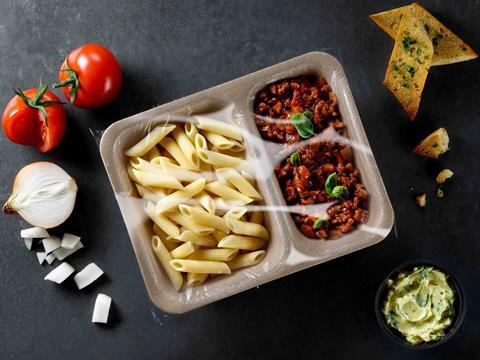
Seal Packaging has launched Infinity TopSeal – its mono-material, recyclable packaging solution made from Klöckner Pentaplast’s expanded polypropylene with a heat-sealable film lid – for use in food service and delivery applications.
Infinity TopSeal is envisioned for use in restaurants, pubs, garden centres, healthcare, and other applications. It is designed to serve as a drop-in replacement for rigid polypropylene containers without requiring additional investment, as it is apparently compatible with existing sealing equipment.
As well as being easy to use, according to Seal Packaging, it offers insulating properties that claim to keep food over 10°C hotter over a longer period of time than its market alternatives. At the same time, it is said to provide a low heat transfer rate that keeps the packaging itself cool to the touch.
Additional features reportedly include water resistance without the need to provide extra coatings or additives; and resistance to the acids, alkalis, and hot oils that can be found in various foods and sauces. These features are set to keep food warm and reduce both leakage and odour transfer.
Furthermore, its tamper evidence is said to ensure that food is secure and delivered with integrity. As such, the solution aims to guarantee hygiene and prevent product loss or interference during delivery, which both protects consumers and maintains the reputation of the food outlet.
With various retailers phasing expanded polystyrene out of their packaging, especially in light of legislative changes banning the material in Scotland and England, expanded polypropylene is anticipated to be a suitable replacement. Infinity TopSeal is also expected to contribute towards Seal Packaging’s goal of enabling its customers to reach net zero and ensuring that its products are as sustainable as possible across every stage of the value chain.
“At Seal Packaging, our mantra is ‘Packaging with Integrity’ and we are always seeking sustainable solutions which deliver as many operator and end-user benefits as possible,” says Kevin Curran, who acquired Seal Packaging alongside Sally Gabbitas last year. “Infinity TopSeal is a truly revolutionary packaging solution, which ticks so many boxes.
“Available with single or double compartments, these microwavable fully recyclable trays keep food hotter for longer, while staying cool to the touch. They weigh less than traditional sealable options – as the material they are made from is over 60% air – and they therefore have a low carbon footprint. In short, Infinity TopSeal from Seal Packaging represents the future of sustainable top-seal packaging for food-to-go.
“We are pleased to have partnered with Klöckner Pentaplast, as they are one of the most proactive and innovative materials manufacturers on the global market.”
“Using Infinity TopSeal from Seal Packaging can also make a significant contribution to reducing food waste,” adds Sally Gabbitas. “In factory and office canteens, at the end of each meal service, caterers can now hygienically portion and seal left-overs to freeze and use later, while in educational establishments, portioned left-overs can be sealed and sold to students.
“In healthcare, Infinity TopSeal enables the creation of diet- and allergen-safe meals in bulk which can then be portioned, sealed and chilled or frozen for later use.”
Various sustainability-minded food delivery solutions came to light last year, from Sustainability Awards finalist HelloFresh and its Systematic Cooling Concept for optimised thermal performance to Smurfit Kappa’s recyclable corrugated cardboard insulation packs created for Mindful Chef.
In addition, Google has launched its Single-Use Plastics Challenge in search of more sustainable packaging solutions for delivery to and dining in its cafes and MicroKitchens.
If you liked this article, you might also enjoy:
McKinsey on whether or not on-pack sustainability claims affect consumer spending
A deep dive into the most important packaging sustainability trends and solutions














No comments yet